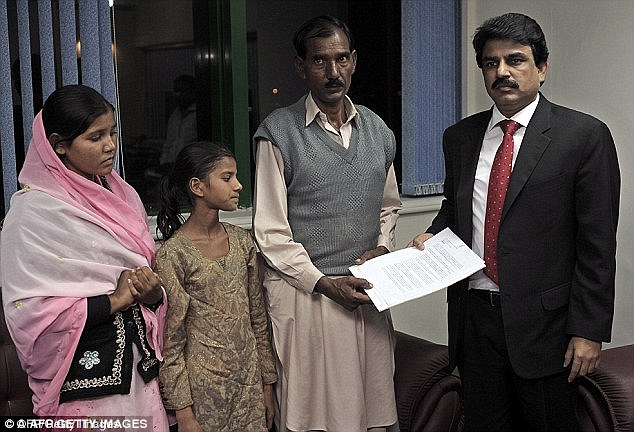In 2010, Asia Bibi got into a dispute with neighbours and co-workers after they objected to her drinking water from their glass because she was not Muslim.She was later reported for defiling the name of the prophet Mohammed during the argument and became the first woman to be sentenced to death under Pakistan's controversial blasphemy law.The shocking case hit global headlines after two prominent politicians who tried to help Ms Bibi were assassinated, one by his own bodyguard.Lawyers showered the killer with rose petals when he appeared in court and the judge who convicted him of murder had to flee the country. Ms Bibi's lawyer, Naeem Shakir, said her accusers have contradicted themselves.Two witnesses allegedly involved in the incident did not appear in court, he said. A prayer leader did appear, saying he did not witness the original altercation, but that Ms Bibi had confessed in front of him.Mr Shakir said: 'I was expecting the opposite decision. We will file an appeal to the Supreme Court of Pakistan in a few days.'But Gulam Mustafa, the lawyer for the complainant, said the court's decision was correct.He said: 'Asia's lawyer tried to prove that the case was registered on a personal enmity but he failed to prove that.'Rights groups say the blasphemy law is increasingly exploited by religious extremists as well as ordinary Pakistanis to settle personal scores. The law does not define blasphemy and evidence might not be reproduced in court for fear of committing a fresh offence. There are no penalties for false accusations.Those accused are sometimes lynched on the spot. If they are arrested, police and the courts often allow trials to drag on for years, afraid of being attacked if they release anyone accused of blasphemy.Only one person has been executed since Pakistan imposed a de facto moratorium on executions in 2008.This year has seen a record number of blasphemy cases as well as increasing violence against the accused. (dailymail.co.uk)Bakudaily.Az
Pakistani woman sentenced to hang for 'blasphemous' comments - PHOTO
World
14:32 | 18.10.2014

Pakistani woman sentenced to hang for 'blasphemous' comments - PHOTO
A Pakistani Christian woman sentenced to death for blasphemy after making derogatory remarks about Islam to her Muslim neighbours has lost her appeal to have the decision overturned.
Follow us !










